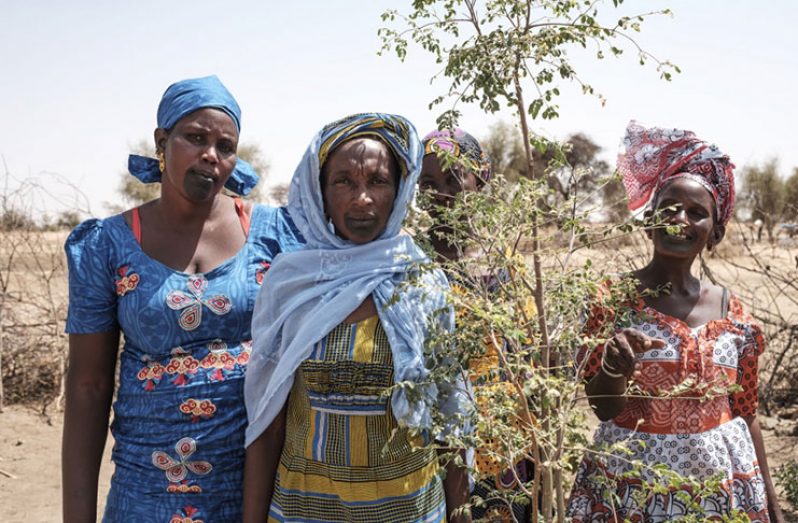For billions of people around the world, rural transformation means new opportunities. Greater access to knowledge and tools means more productive farming, while greater productivity on the farm means more resources for education, health and other activities. Through rural transformation, rural people can drive economic growth, fight hunger and lift their own communities out of poverty.
To realize this potential, however, rural transformation needs to be inclusive. As it stands, women – and especially young women – are unable to take advantage of all the opportunities that rural transformation can provide. With less education, fewer job opportunities and more restrictive cultural expectations, young rural women typically face additional barriers that other people in poverty do not. Unless policies address these disparities, rural transformation runs the risk of continuing to overlook the needs of young rural women – and leaving women further behind.
Because of the pre-existing challenges that young rural women face, inclusive rural transformation won’t just happen naturally. Rather, we need to make it happen. Here are five ways that FAO is addressing these challenges and increasing inclusivity by enabling young rural women to participate in rural transformation.
1. Freeing up women’s time
With workloads similar to their adult counterparts, young rural women are often responsible for arduous and time-consuming tasks (such as gathering water and firewood, weeding and manually processing food) on top of their role of caring for other people in the household. These demands significantly limit the time women have to study or develop other income-generating opportunities.
As a result, women benefit significantly from investment in time-saving basic infrastructure, such as improved access to sources of water and energy. Farming technology like tractors and milling facilities can also cut down on women’s labour, freeing up their time to develop new livelihoods and engage in activities outside the home.
2. Promoting life-long learning and skills development

Despite relatively high rates of primary school attendance, rural women tend to have low literacy rates and spend less time in secondary school than their male or urban peers. Distance, safety, costs and parental attitudes about educating daughters all affect rural girls’ attendance; meanwhile, even fewer girls continue to attend during menstruation or after giving birth. Additionally, educational opportunities outside of school, such as vocational training, may not be relevant or available to young rural women.
Increasing educational opportunities yields significant improvements in the lives of women: educated girls are more likely to delay marriage, find work and raise healthier children. Programs aimed at making secondary school more accessible (by reducing fees, strengthening counselling services or foregrounding discussion of gender) and improving vocational training (by matching skills training to local market opportunities, or by tying financial literacy lessons into training on nutrition, entrepreneurship or farming) are both ways to promote learning for young rural women. Especially with the help of woman mentors, young woman can gain the benefits of not only education, but also of increased confidence and broadened aspirations.
3. Broadening livelihood opportunities
Rural women face a number of challenges to developing self-sufficient livelihoods. Although over half of rural women work in agriculture, they are usually self-employed or working for family members – as land tends to be passed down to men. Additionally, young woman tend to face greater difficulties in accessing markets and finance services, which also inhibit their opportunities for off-farm entrepreneurship. Even when women do earn some money, only about a quarter of them have sole decision-making power over how to spend it.
Providing more employment opportunities for women on and off the farm can help entire rural economies grow. Modernising agriculture, and helping young rural women secure loans and land, can strengthen women’s engagement in the agricultural sector. Meanwhile, mixed-sex youth groups that offer training in technical skills can help challenge the traditional perceptions that impede women’s full participation in off-farm economies.
4. Stimulating positive behavioural change
In many rural communities, attitudes must change in order to free women from culturally determined lives. Radio listeners’ clubs can help foster conversations about sensitive topics like gender-based violence, HIV/AIDS and early marriage, while self-help groups and producer organizations enable women to be active members and leaders within their communities. Meanwhile, programs for young men and boys are challenging stereotypes and building support for the rights of women and girls. Addressing the root causes of gender inequality through positive behavioural change is key to enabling young rural women to fully participate in (and benefit from) rural transformation.
5. Strengthening voice and representation
Finally, young rural women need to be given more of a voice in the decision-making processes that affect them. Traditional community norms may restrict the participation of women and youth, which means the specific needs of young rural women are rarely known or taken into account. As a result, the challenges that rural woman face often remain unaddressed. However, strengthening rural youth organizations, establishing a minimum level of representation at policy dialogues and providing training in public speaking and leadership are all ways to make sure the voices of young rural women have a better chance of being heard – and that rural transformation can be truly inclusive.
If we are to achieve #ZeroHunger and end rural poverty, we can’t afford to leave young rural women behind. Women comprise about 43 percent of the agricultural labor force, but even more of its potential. Effective rural transformation means inclusive rural transformation, and rural transformation means making sure that everyone, including young rural women, has the ability, opportunity and means to live differently. Only by tapping this potential can we make #ZeroHunger a reality.





.jpg)








